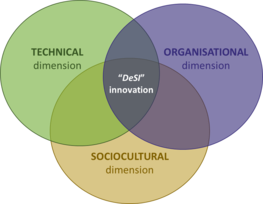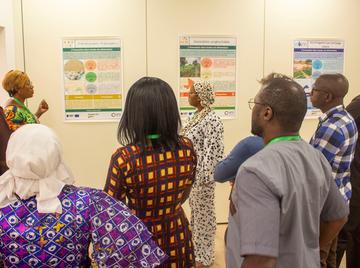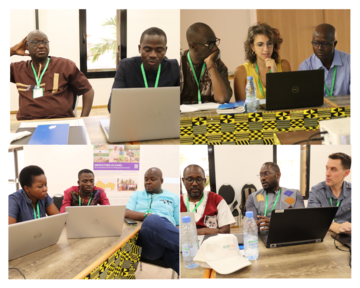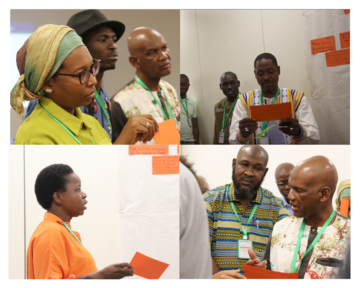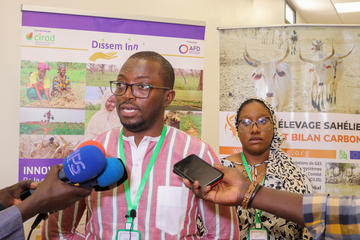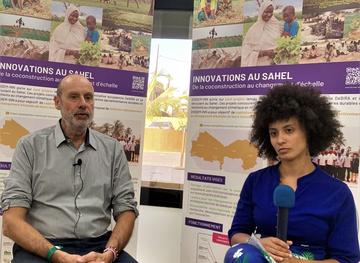Inter-DeSIRA workshop on sustainability and scaling of innovations
An Inter-DeSIRA regional workshop was recently held in Saly, Senegal from March 5 to 7, 2024. Bringing together representatives of eight DeSIRA projects, the event focused on the sustainability and scaling of DeSI innovations in the Sahel region.
Context
As characterized in the previous regional workshop, the pursued "DeSI" approach to develop these innovations comprises three principles: a multi-actor, co-constructed and innovative approach taking into account three dimensions.
Bringing together representatives of the eight DeSIRA projects involved in DISSEM-INN activities, this inter-DeSIRA regional workshop focused on their innovations themselves. Altogether, sixteen innovations were selected by these eight projects, in their respective countries of intervention (Benin, Burkina Faso, Chad, Mali, Mauritania, Niger and Senegal), for in-depth consideration at this workshop.
In line with the third principle of the "DeSI" approach, each of these sixteen innovations has three dimensions:
- Firstly, a "technical" or "material" dimension, including for example, varieties, seeds, physical inputs, machines, tools and software;
- Secondly, an "organizational" dimension related to ways of working, new institutions or modes of organization, including networks of actors, innovation platforms, value chains, rules;
- Lastly, a "sociocultural" dimension related to values, ways of thinking and behavioural habits, including perceptions, opinions, paradigms and beliefs.
Robin Bourgeois, coordinator of the DISSEM-INN project, stressed the importance of studying the sustainability of these innovation beyond the end of the projects to guarantee their effectiveness. In his view, sustainability means developing strategies to maintain the results achieved and the activities implemented, even after the initial funding has run out. Chloé Lesenfans, consultant on the coordination of the DISSEM-INN project, pointed out that: "This meeting has two main objectives: to facilitate the sharing of experiences and strategies between projects to encourage the sustainability of their innovations, and to encourage reflection on scaling, i.e. how to reach larger geographical areas and a wider public".
Course
This three-day regional DISSEM-INN workshop was based mainly on presentations, scientific posters, group work and plenary discussions (see TDR).
The first day was devoted to discovering the sixteen innovations developed by each DeSIRA project.
Through a "Panorama of Innovations", based on posters prepared by DISSEM-INN, the focal points shared their advances in the technical, organizational and socio-cultural dimensions. Then, they explored these dimensions in greater depth, reflecting on their degree of novelty, i.e., whether the innovation in question brings an incremental or a major change with what was done before.
The second day enabled participants to familiarize themselves with an analytical framework proposed by DISSEM-INN regarding the sustainability and scaling of innovations. Group work focused on connecting the framework with the participants' experience within their respective projects, and included a presentation of the results. This framework was then used by each project team to analyse the degree of advancement in making these innovations sustainable. Discussions also focused on practices that could ensure or reinforce sustainability.
Finally, the last day enabled all participants to experiment with the analytical framework on the scaling of the innovations, working again in project teams and sharing results. This enabled them to identify key messages on the links between the various dimensions of innovation and methods of dissemination, underlining the significant contribution of this analytical approach in terms of impact for their projects and for setting up future projects.
Feedback and outlook
"We evaluated and quantified the different dimensions of these innovations, during a practical exercise involving the completion of dedicated forms. Our changes are mainly of a technical nature, notably in farming practices. But filling in these forms enabled us to unveil the organizational and socio-cultural dimensions of these innovations - aspects that are often neglected, but essential," emphasized Dr. Mame Farma Ndiaye, coordinator of the FAIR Sahel project in Senegal and Director of the Centre de Recherches Agricoles (CRA) in Saint-Louis. "By focusing on these dimensions in the future, we will be able to accelerate the process of adoption of these practices by farmers", she confided.
Returning to the reasons for his participation, Marc OUEDRAOGO, focal point of the IRRINN project in Burkina Faso, highlights a double interest for his project.
He points out that this "workshop offers an opportunity to exchange and share experience with other partners who, although working on other themes, share similar approaches". This participation enables his team to "observe the successes of other projects, and learn from them" for their own project. It also enables them to identify potential synergies of action with these partners.
Like Marc, several focal points and project managers stressed the importance of their participation in this workshop, given the advanced stage of their projects. They see discussions on the sustainability and scaling of the innovations as a priority for their projects.
"It's an opportunity for CaSSECS to attend this kind of meeting. It will enable us to share our practices and think about how to make them sustainable and scale them up," said Habibou Assouma, researcher and focal point of the CaSSECS project in Burkina Faso. "It is crucial to move from experimentation to scaling, in order to have a real impact in the field," he continued.
***
According to the workshop facilitators (Robin & Chloé), the results and messages emerging from this seminar will play a key role in guiding future projects in their purpose of sustainable agricultural development in the Sahel. The lessons learned will be incorporated into the forthcoming synthesis workshop, to provide useful insights for all stakeholders involved in the design, funding, implementation and capitalization of such projects.
Published: 26/03/2024

